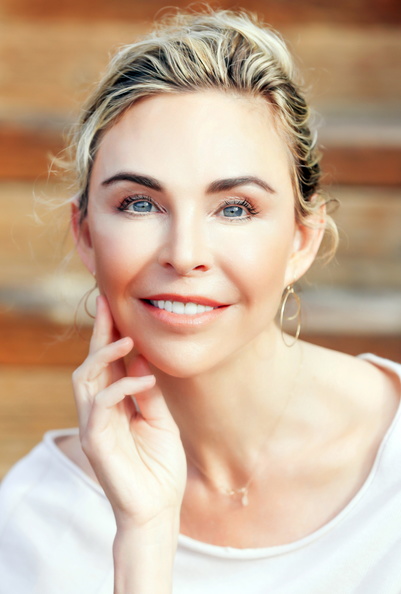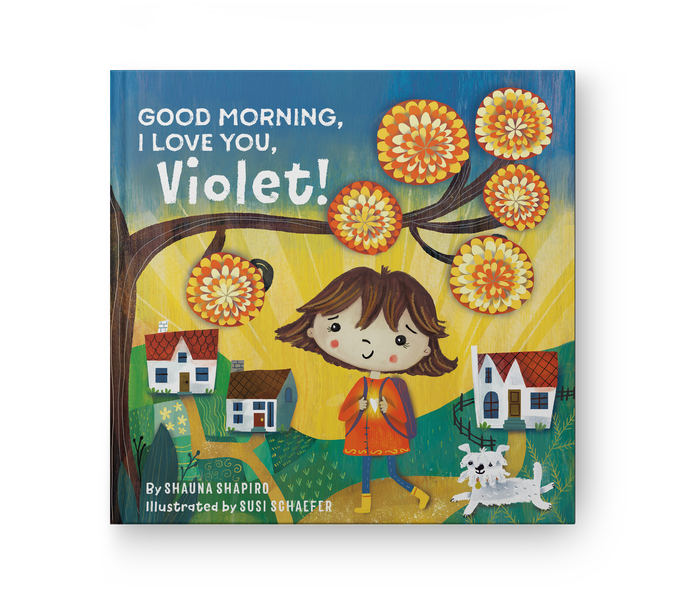
Shauna Shapiro, PhD, is a bestselling author, clinical psychologist, and internationally recognized expert in mindfulness and self-compassion. She is a professor at Santa Clara University and has published over 150 papers and three critically acclaimed books, translated into 16 languages. Dr. Shapiro has presented her research to the king of Thailand, the Danish government, Bhutan’s Gross National Happiness Summit, and the World Council for Psychotherapy, as well as to Fortune 100 companies including Google, Cisco Systems, and LinkedIn. Her work has been featured in the Wall Street Journal, Forbes, Oprah, NPR, and American Psychologist. Dr. Shapiro is a summa cum laude graduate of Duke University and a Fellow of the Mind & Life Institute, cofounded by the Dalai Lama. Her TEDx Talk, “The Power of Mindfulness,” has been viewed over 3 million times.
Author photo © April Bennett
Dear Sounds True friends,
I believe self-love is a superpower.
When we treat ourselves with kindness, it turns on the learning centers of the brain and gives us the resources to face challenges and learn from our mistakes. Transformation requires a compassionate mindset, not shame.
And yet, people often worry that self-love will make them lazy, self-indulgent, or self-absorbed. Science shows just the opposite: people with greater self-love are more compassionate toward others, more successful and productive, and more resilient to stress.
The best news of all: self-love can be learned. We can rewire the structure of our brain and strengthen the neural circuitry of love toward ourselves and others. Each time we practice self-love, we grow this pathway.
My new children’s book, Good Morning, I Love You, Violet!, offers a road map for strengthening your child’s brain circuitry of deep calm, contentment, and self-love.

It is built on principles of psychology and neuroscience and offers a simple yet powerful practice.

As a mother, when asked what I believe is the most important thing we can teach our children, I always answer “self-love.” Learning to be on our own team and to treat ourselves with kindness is life-changing. There is no greater gift we can give our children. There is no greater gift we can give ourselves.

May this book plant seeds of kindness that ripple out into the world.

Shauna Shapiro, PhD
P.S. I invite you to download a free coloring sheet from the book, created by illustrator Susi Schaefer, to enjoy with the children in your life.

Shauna Shapiro is a mother, bestselling author, professor, clinical psychologist, and internationally recognized expert in mindfulness and self-compassion. She lives in Mill Valley, California. Learn more at drshaunashapiro.com.

Learn More
Amazon | Barnes & Noble | Bookshop | Sounds True
Shauna Shapiro, PhD, is a teacher, public speaker, and author whose published works include The Art and Science of Mindfulness and Mindful Discipline. With Sounds True, she has published Good Morning, I Love You: Mindfulness and Self-Compassion Practices to Rewire Your Brain for Calm, Clarity, and Joy. In this episode of Insights at the Edge, Tami Simon speaks with Shauna about the neurology of self-image and why conscious acts of self-compassion greatly enhance our well-being. Shauna comments on practicing mindfulness with warmth and open affection, as well as how this gradually cultivates empathy. Tami and Shauna also talk about “trusting the good heart” and the possibility of changing our baseline levels of happiness. Finally, they discuss why changing ingrained habits is so difficult and the subtle power of the daily self-affirmation, “Good morning. I love you.”(55 minutes)
Most people feel trapped in a thousand ways. But more often than not, this sense of entrapment us into putting our heads down and getting the things we are expected to get done, done. We can’t often see the entrapment, especially if it looks like the result of our own choices in life. But were they truly our own choices? What if some of the choices we made in life have never really been ours to begin with?
I want to take us back a little. Back to when we were younger. When we had to rely on the wisdom of our elders, and those who have been in this life much longer than us. In my upcoming book Invisible Loss, I write about that time in our lives when we were at our most rebellious:
Disobedience—as a child, as a teen, as an adult in the world of work and home—is an act that creates invisible suffering. We learn to survive that repeated pattern of being commanded by our elders to be “good.” In order to be good and obey, we may create a life closer to that command but further away from our Original Self. We may work hard trying to be good, trying to please and fit into the mold created for us, but that only helps to build our Waiting Room life.
But time in the Waiting Room doesn’t need to last forever. And you don’t have to die inside it. There are parts within you that can bring forth a life worthy of your human existence. Places within yourself that have no shame.
As long as we have been alive, creating a life that aligns closest to the wishes of our caregivers and protectors blinds us to the life that we could choose for ourselves. That life is completely hidden even if we think we know our wishes. Often, only when we go through tragic or invisible losses, do we start to question those choices. Dare I say, these moments are opportunities to exit the loop of being “good.”
It is time to interrupt our regular transmission. It is time to be clear when it comes to what it is we are trying to communicate to the people in our lives. It starts from no longer trying so hard to fit into the mold that was created for us. No matter how old we are, we can always break outside this mold and align our choices with our true values and desires.
This is not an easy task. I understand that. At the core of my book, Invisible Loss, I’ve created tjos easy practice to help set you on the right path to your Original Self. I call it Mental Stacking:
What Is Mental Stacking?
Mental Stacking is the ability to intentionally layer your thoughts to replace unconscious, Survivor-based
thinking with Wisdom-based thinking. In doing so, these Wisdom-based thoughts can more easily be converted into real-life action. This Stacking practice allows you to access your true and authentic self (your Original Self) and entrust it with the controls of your life. Here is what a basic Stack looks like:
Your Mental Stack leads you to a specific next step that may not always be easy to see without the power of each previous layer in the Stack.
Here’s to a great new chapter ahead,
Christina Ramussen

Invisible Loss
Amazon | Barnes & Noble | Bookshop | Sounds True

Christina Rasmussen is an acclaimed grief educator and the author of Second Firsts and Where Did You Go? She is the founder of the Life Reentry Institute and has helped countless people break out of what she coined the “waiting room” of grief to rebuild their lives through her Life Reentry® Model, a new paradigm of grief, based on the science of neuroplasticity. She lives in Austin, Texas. For more, visit christinarasmussen.com.
Author photo © Marc Olivier Le Blanc
When people ask for my personal secret to living a life that is authentically happy and liberating, the first thing that comes to mind are my friends. I’ve known for a long time that I am a wealthy and blessed person. The wealth that I’m referring to has nothing to do with my bank account balance. The wealth that I’m talking about are the meaningful connections that have sustained me over the years. What I lacked in familial bonds, the divine provided in long-term platonic relationships.
One of the clearest indicators of someone who is flourishing is their ability to build and keep meaningful connections and quality relationships. When designing a life that supports your becoming the most fully expressed version of yourself, the people who are closest to you can either support or hinder your progress. This is why I’m adamant about being intentional about my connections.
My “Presidential Cabinet,” which is basically what I call my trusted circle of friends, is filled with some amazing folks. I’m forever grateful for my community of friends that became family, strangers that became mentors, and colleagues that became accountability partners.
In the chapter “What About Your Friends?” from my book, Evolving While Black, I share with you that people who have strong relationships feel the support of family, friends, and others in their community. When you know you have a village of folks you can count on, it improves your ability to recover from stress, anxiety, and depression.
An agreement I made with myself in my early thirties was to commit to choosing connection and community over isolation. This decision is the gift that keeps on giving. The investment you make in choosing your connections is the greatest pathway to wholeness, prosperity, and longevity.
What you should consider as you’re continuing to build out your own Presidential Cabinet
Your connections should include people who:
Now that you know what to consider, use these prompts to create a plan
My hope for you is that you attract meaningful connections that bring you joy and make your heart smile, laughs that make your cheeks hurt, and love that covers you like a warm blanket. You deserve to feel loved, supported, and cared for.
Until we meet again.
Currently evolving,
Chianti

Evolving While Black
Amazon | Barnes & Noble | Bookshop | Sounds True

Evolving While Black
Sounds True

Chianti Lomax is a sought-after international speaker, certified mindset coach, and leadership trainer who thrives at the intersection of mindfulness, technology, and transformative coaching. As a registered yoga instructor, certified personal and executive coach, certified workplace mindfulness facilitator, and positive psychology practitioner, Chianti teaches doable habit changes to help increase our well-being and elevate the overall human experience. For more, visit chiantilomax.com.
Author photo © Ambreia Williams
This bonus episode will support you to take the main insights from Episode 3, “We Begin with Gratitude,” deeper into your life.
In Episode 3, we talked about how in the Work That Reconnects we always start with gratitude, because it gives us the strength to speak the truth and act in service of life.
Lovingkindness meditation is a simple and powerful way to feel and express our gratitude and love for our world.
All you need to do this bonus exercise is a quiet place where you can meditate. We hope you’ll do this exercise with someone else, so that you can talk together about your experience after you finish.
We recommend starting a podcast club with friends or family to do these practices together. Links and assets to help prompt reflection and build community can be found with every episode on WeAreTheGreatTurning.com.
© 2024 Sounds True. All rights reserved.